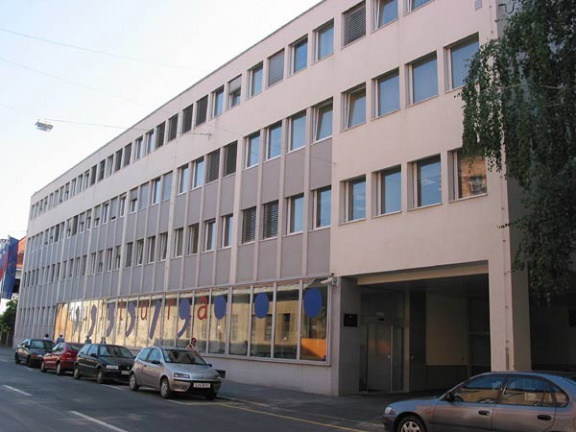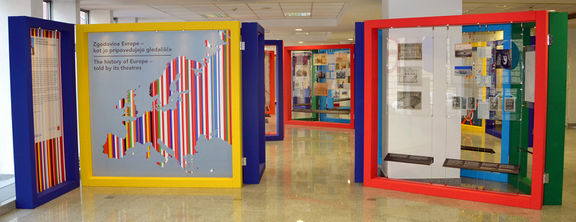Difference between revisions of "Ministry of Culture"
| Line 96: | Line 96: | ||
** [[INDOK Cultural Heritage Centre, Ministry of Culture|INDOK Centre]] | ** [[INDOK Cultural Heritage Centre, Ministry of Culture|INDOK Centre]] | ||
* [[Media Directorate, Ministry of Culture|Media Directorate]] | * [[Media Directorate, Ministry of Culture|Media Directorate]] | ||
| − | * [[European Affairs and International | + | * [[European Affairs and International Co-operation Service, Ministry of Culture|European Affairs and International Co-operation Service]] |
* [[Department for Slovenian Language, Ministry of Culture|Department for Slovenian Language]] | * [[Department for Slovenian Language, Ministry of Culture|Department for Slovenian Language]] | ||
* [[Department for Cooperation with Civil Society, Ministry of Culture|Department for Cooperation with Civil Society]] | * [[Department for Cooperation with Civil Society, Ministry of Culture|Department for Cooperation with Civil Society]] | ||
Revision as of 12:48, 30 January 2014
|Class 'MediaWiki\Extension\Xoo\ParserFunctions\Variables' not found
| first = }}{{#arr:dataloop |Class 'MediaWiki\Extension\Xoo\ParserFunctions\Variables' not found
| first =-
| each =
-
18 Jan 2025
{{{Country}}} {{{City}}} {{{Venue}}}
{{{Description}}}
}}{{#arr:dataloop |Class 'MediaWiki\Extension\Xoo\ParserFunctions\Variables' not found
| first =-
| each =
-
18 Jan 2025
{{{Country}}} {{{City}}} {{{Venue}}}
{{{Description}}}
{{#arr:dataloop |Class 'MediaWiki\Extension\Xoo\ParserFunctions\Variables' not found
| first =
-
| each =
- [{{{Url}}} {{{Name}}}], {{{Year}}}, [[{{{Department}}}]]
[{{{Ccp}}} Project summary]
| last = Show more
}}
Background
The Ministry of Culture was founded in June 1991 on the basis of the Organisation and Competence of the Republic Administration Act. Under this Act, the existing Republic Secretariat for Culture continued its work as the Ministry of Culture and took over its functions and staff. The existing Republic Secretary for Culture became the Minister for Culture. After Slovenia's proclamation of independence, the Republic of Slovenia gained its first Minister for Culture on 28 June 1991, the day the Act entered into force.
In February 2012 the Ministry of Education, Science, Culture and Sport was established, merging the Ministry of Education and Sport, the Ministry of Higher Education, Science and Technology and the Ministry of Culture. In March 2013 the Ministry of Culture has been re-established.
Resolution on the National Programme for Culture 2014–2017
In September 2013 the Government of the Republic of Slovenia agreed on the draft Resolution on National Programme for Culture 2014–2017, a key document for the area of culture that has been prepared by the Ministry of Culture. The resolution has updated the culturaly policy. It includes planned investments in culture infrastructure and sets goals and priorities, a novelty presents a chapter on the labour market in the cultural sector that defines the first guidelines for employment strategies. The number of those employed in the cultural sector should be increased by 2017, and the measures promote employment in NGOs, in the private sector and self-employment.
Tasks
It is the task of the ministry to provide suitable opportunities for cultural creation and the protection of the cultural heritage. To this end, the Ministry works on the basis of the three main principles of cultural policy: quality, accessibility, and diversity. Undoubtedly the first task of the Ministry is to provide suitable opportunities for top-level creativity in cultural spheres. Equally important is the guaranteeing of the greatest possible accessibility of cultural assets, since the right to culture ranks among fundamental human rights. Closely connected to these two principles is the attention that the Ministry of Culture devotes to cultural diversity. Additionally, the Ministry protects the right to freedom of expression in the media and ensures the media pluralism.
Funding
Where funding of public institutions is concerned, there are special calls for archive institutions and libraries, for movable cultural heritage institutions (mostly museums), for unmovable cultural heritage projects (investments in infrastructure) and for audio-visual programmes. All public state cultural institutions are required to present their following year's programmes to the Ministry of Culture, which then decides on their annual subsidy according to the annual budget.
For non-governmental organisations, the Ministry announces (usually in Autumn) a call for public cultural programmes and projects. From amongst applicants in various disciplines 42 cultural programme organisers and producers were selected to sign 4-year contracts for the period 2010–2013, most of them professional support organisations or the producers running a venue or festival platforms. In addition there is a bid for the 4-year author projects and an annual bid for artistic projects in all art disciplines, which is open also to smaller organisations and individual artists.
Every year there is also a special call for cultural activities by the Italian and Hungarian ethnic minorities, the Romany community and other ethnic minority groups and immigrants in the Republic of Slovenia.
Funding related to literature and publishing has been performed by the Slovenian Book Agency, while the national cultural programme in the sphere of film is implemented by the Slovenian Film Centre.
The ministry supports a few specialised digital web platforms: next to Culture.si also Sigledal.org - Slovene theatre portal and Sigic.si - information on Slovene music, the national aggregator for Europeana National and University Library and its DLib.si - Digital Library of Slovenia.
International co-operation
International projects and festivals are supported through the programme and project public calls for producers. There are also some additional special public calls related to international co-operation. One is open to creators to bid for short-term residency in apartments owned by the Ministry in New York City, Berlin, London and since 2011 also in Vienna. Another determines the operator of the EU Cultural Contact Point Slovenia, the mediadesk.si and the international cooperation portal Culture.si. Other calls are for the organisers/curators of the Venice Biennale and Venice Biennale of Architecture.
Ministry of Culture supports participation of Slovene young talents in the European Union Youth Orchestra (EUYO).
Membership in international organisations
The Ministry of Culture collaborates on a regular basis with the Council of Europe and other European bodies (Attaché for Culture and Audiovisual affairs at the Permanent Representation of the Republic of Slovenia to the European Union). Slovenia is a member of European Audiovisual Observatory.
The ministry has its representative in the Slovenia National Commission for UNESCO and contributes into the International Fund for Cultural Diversity (IFCD). It has cooperated also with the European Cultural Foundation and the Asia Europe Foundation (ASEF).
The Ministry is a permanent guest of the EUNIC Slovenia network of the European Union National Institutes for Culture in Slovenia, and the member of the International Federation of Arts Councils and Culture Agencies (IFACCA).
See also
Directorates, departments and services
- Creativity Directorate
- Cultural Heritage Directorate
- Media Directorate
- European Affairs and International Co-operation Service
- Department for Slovenian Language
- Department for Cooperation with Civil Society
- Department for Cultural Diversity and Human Rights
- Department for State Ceremonies
- Office for Religious Communities, Ministry of Culture
- Project Unit for the European Cohesion Policy Implementation
Bodies under the Ministry
Funds
National Councils
Other ministries
External links
- Ministry of Culture website
- Resolution on the National Programme for Culture 2014–2017 (in Slovenian)
- Survey the Economic Contribution of the Copyright-Based Industries in Slovenia (pdf, in Slovenian)
- IFACCA website





